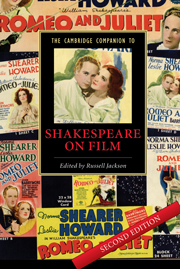Book contents
- Frontmatter
- Introduction: Shakespeare, films and the marketplace
- Part I Adaptation and its Contexts
- Part II Genres and Plays
- Part III Directors
- Part IV Critical Issues
- 14 Looking at Shakespeare’s women on film
- 15 National and racial stereotypes in Shakespeare films
- 16 Shakespeare the illusionist: filming the supernatural
- 17 Shakespeare’s cinematic offshoots
- Further Reading
- Filmography
- Index
- Series List
16 - Shakespeare the illusionist: filming the supernatural
from Part IV - Critical Issues
Published online by Cambridge University Press: 28 July 2007
- Frontmatter
- Introduction: Shakespeare, films and the marketplace
- Part I Adaptation and its Contexts
- Part II Genres and Plays
- Part III Directors
- Part IV Critical Issues
- 14 Looking at Shakespeare’s women on film
- 15 National and racial stereotypes in Shakespeare films
- 16 Shakespeare the illusionist: filming the supernatural
- 17 Shakespeare’s cinematic offshoots
- Further Reading
- Filmography
- Index
- Series List
Summary
Reginald Scot’s 1584 treatise The Discovery of Witchcraft has a section entitled 'To cut off one’s head, and lay it in a platter, which the jugglers call the decollation of John the Baptist'. Scot explains how the Elizabethan playhouses worked this particular conjuring trick by means of a stage-device that looked like a pillory, and which showed one actor’s head as if it belonged to another body. Other contemporary documents describe many similar illusions, which seem to have been common on the stage as well as on street-corners. Opinion was divided about their value: Ben Jonson despised their vulgarity in the Induction to Bartholemew Fair, some denounced them as witchcraft, others felt that 'if these things be done for recreation and mirth, and not to the hurt of our neighbour, nor to the profaning and abusing of God’s holy name, then sure they are neither impious nor altogether unlawful, though herein or hereby a natural thing be made to seem supernatural'. It would be a mistake therefore to assume that members of Shakespeare’s audience automatically suspected that such 'jugglers' were in league with the devil, even though several contemporary plays, from Doctor Faustus to Friar Bacon to Volpone exploit that idea - for fear, for laughs, for satire. The inherent theatricality of Shakespeare’s plays (disbelief only partially suspended) means there is room for lots of stage-tricks in the midst of the ordinary pretences of his theatre (costumes, stage-voices, boys as women). Both depend on illusion, but there is also a complex relationship, often a necessary conflict, between the representation of the mundane and the marvellous.
- Type
- Chapter
- Information
- The Cambridge Companion to Shakespeare on Film , pp. 280 - 302Publisher: Cambridge University PressPrint publication year: 2007

